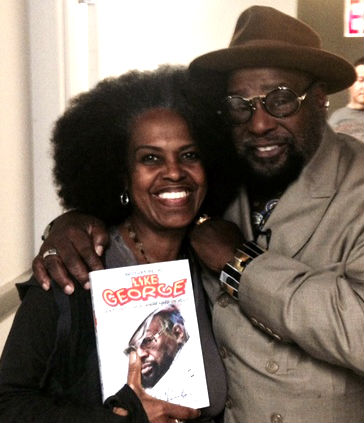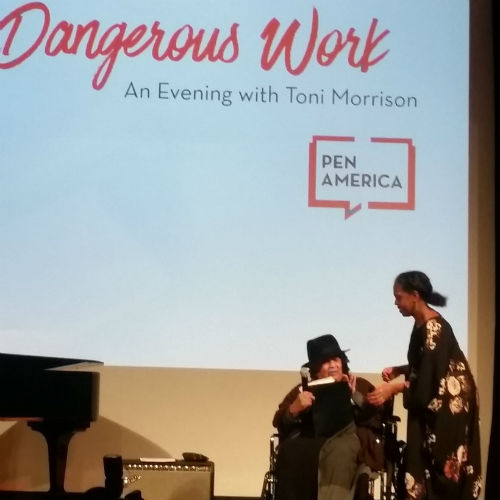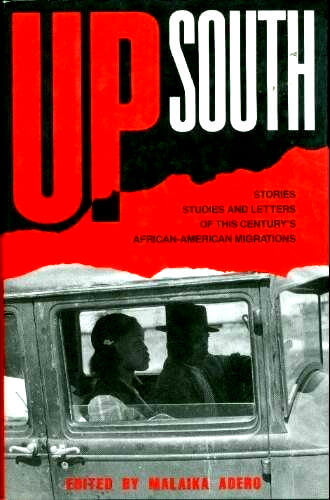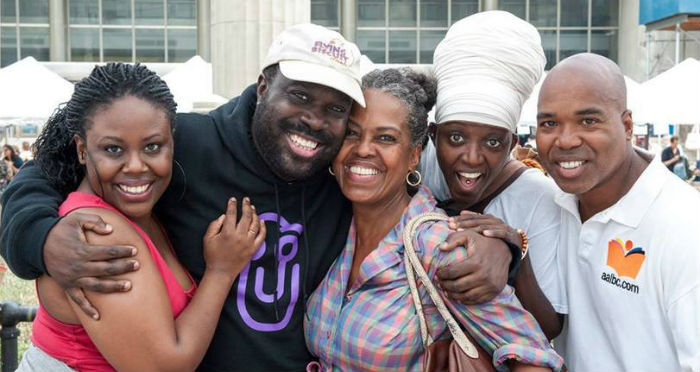 Malaika with George Clinton of the Parliament Funkadelic. They are posing with his book Brothas Be, Yo Like George, Ain’t That Funkin’ Kinda Hard on You?—which she signed and edited.
Malaika with George Clinton of the Parliament Funkadelic. They are posing with his book Brothas Be, Yo Like George, Ain’t That Funkin’ Kinda Hard on You?—which she signed and edited.
Her name is Malaika Adero… She is a renaissance woman. She is a dancer. She is an artist. She knows how to play in the space of words. She is going to talk to us today about the state of black publishing.” —Max Rodriguez, Executive Director, the Harlem Book Fair
Matthew 5:5 of our Bible says, “The meek shall inherit the earth.” In the case of American world literature (sometimes called “black literature”), the meek are the salt of the earth, if not the earth itself. Malaika Adero doesn’t call a lot of attention onto herself. She does her work methodically and pointedly, beautifully, year after year, decade after decade without a lot of fanfare. Isn’t that how angels operate though? All you see of Malaika are the volumes of books that she has birthed as well as the regular celebration of our global village griots and ancestors under the expanse of large colorful wings. This is royalty. She is part of the 13th-century continuum of West African history from those kingdoms of Ghana, Songhai and Mali. She comes to us from the tradition of the griot—a story teller or praise singer who is a historian and often seen as a community and cultural leader, often times an advisor to persons of royal designation (think Miles Davis, Nelson Mandela, Prince, Toni Morrison, or Spike Lee amongst countless others). Malaika has been and is all that, now.
“One of the reasons for having the publishing institute is to go out and sell pubIishing as a career opportunity to members of the minority communities,” observes Charles Harris, executive director of the press and a 26-year publishing industry veteran. “As it is,” he says, “the Black presence in publishing is miniscule…” —New Directions, October 1, 1982, published by Howard University’s Publishing Institute
Malaika has spent nearly 40 years in the aforementioned publishing industry. Born in Knoxville, Tennessee, Malaika was an inaugural student for Publishing Institute at Howard University in 1980. Since then, she has worked on dozens of novels, including many New York Times best sellers, with authors such as Common, Blair Underwood, Reyna Grande, T.D. Jakes, George Clinton, Nelson Mandela, James Meredith, Victoria Rowell, and Zane. One of her early and most celebrated projects was Miles: The Autobiography with Quincy Troupe which won the 1990 American Book Award and for whom Quincy Troupe and Miles Davis acknowledged Malaika not only for her co-editing but bringing the idea to Simon and Schuster for publication. That classic was published on September 15, 1990, almost 30 years ago. Just last week, however, Malaika curated a tribute at the New School for Toni Morrison, winner of the 2016 PEN/Saul Bellow Award for Achievement in American Fiction.
Within the world of literature and Big Five Book publishers, the name, ‘Malaika Adero’, is golden, like royalty. ‘Malaika Adero’—non-stop, don’t stop, can’t stop—it’s a legacy thing and she, the ‘djeli’ as griot is written in french, is a movement. She moves, it happens. Volumes of knowledge, wisdom and systems just drop.
“I have worked with Malaika at the National Black Writer’s Conference for two years. She is not only extremely well informed but very passionate about black literature. She is very knowledgeable.” —Clarence Reynolds, Director at the Center for Black Literature at Medgar Evers College, CUNY
The first time I met Malaika was in 2014 at Harlem Book Fair. I sat next to her as Max Rodriguez, the executive director of the Black Book Review and Harlem Book Fair, introduced her to the world through C-Span. She didn’t know who I was. As a matter of fact, I had to introduce myself to her for this article. But I knew who she was—Yessir! I mean, YesMaam!
Max said of Malaika, “I have the honor and privilege of introducing a dear friend, a colleague and a professional. Someone who has, through intellect, intuition and sheer will power, worked and made her mark through publishing. Her name is Malaika Adero… She is a renaissance woman. She is a dancer. She is an artist. She knows how to play in the space of words. She is going to talk to us today about the state of black publishing.”
They left us a legacy, they left us in charge, they left us a body of work, and the lessons and the instructions are just for us to pay attention to that now and to carry on…
I was surprised and honored to have a global village elder, an accomplished griot right there… just sitting there next to me incandescently glowing, just as pretty as can be. Malaika is an elegant lady whose grace, pragmatism and focus underscore every detail she attends to. She wasn’t wearing a svelte purple cape of royalty. No, no, no. There was no plumage of feathers visible to the human eye. There is, however, an undeniable easy je ne se quois that follow her movements and with which she comports herself. But more so, there is a glowing power and immaculate strength with the volumes of projects she has dropped like libraries over a 30 plus year career. She keynoted an event that would feature the talents of Sonya Sanchez, Dr. Imani Perry, and Walter Moseley with panel discussions on American morality, multiculturalism and the African American identity. Mailaka said in the 2014 address:
“The Harlem Book Fair is one of my favorite book events. One, because it is in the neighborhood I live in, so it’s easy for me to get here. The other as you heard from Dr. Muhammad, as you heard from Max Rodriguez is this setting here. Dr. Muhammad talked about Arturo Schomburg who laid the foundation here as a black bibliophile for this collection to rise, for this center, this depository, that is so important not just for us in this community, but in the world, to be built. Dr. Muhammad’s leadership and the family of the Schomburg are carrying the beacon for the legacy that Arturo Schomburg, James Baldwin, our recent literary giants who he named who recently passed on, Maya Angelo, Amiri Baraka, Jayne Cortez… there have been too many that have passed on recently… They left us a legacy, they left us in charge, they left us a body of work, and the lessons and the instructions are just for us to pay attention to that now and to carry on…
I was flattered by Max [Rodriguez’s] invitation asked me to make this talk. He calls me up and just says so casually, I’d like for you to talk about the state of black literature in 15 minutes… How was I going to talk about this thing we call black literature, this thing we call publishing? Particularly at this time when it’s so complicated, there are so many issues, there are so much breakthroughs , so much extraordinary work, there are so many problems. So what exactly will I be talking about? I will be talking about black people, meaning people of African descent here writing and publishing primarily in America and that reach the rest of the world. He and I are on the same page to think in terms of “Global I Am”. It is how I think. It’s how most of the people that are around me think. It is how we need to be thinking more in a systematic fashion in order to reach more people, touch more people, advance our culture and heal the world really. So I can’t think of it as a single state. It’s more like the world of story telling.
He and I are on the same page to think in terms of ‘Global I Am’. It is how I think. It’s how most of the people that are around me think. It is how we need to be thinking more in a systematic fashion in order to reach more people, touch more people, advance our culture and heal the world really. So I can’t think of it as a single state. It’s more like the world of story telling.”
 Toni Morrison and Malaika Adero onstage at the New School for 2016 PEN/Saul Bellow Award for Achievement in American Fiction (Photo Credit:Todd Hunter)
Toni Morrison and Malaika Adero onstage at the New School for 2016 PEN/Saul Bellow Award for Achievement in American Fiction (Photo Credit:Todd Hunter)
“When I started African American Literature Book Club in the 1990’s, Malaika was already established then. We were both working on the advisory board for the Harlem Book Fair. Maliaka recognizes what it takes to manifest our black voices and she has been doing it for decades now.”—Troy Johnson, Founder, African American Literature Book Club
Malaika says of the “Global I Am”, “It is a point of view, more than a movement. It is part of a continuum.” The legacy of her work is a testament to not only black literature but her own ubiquity within American literature. Last week she co-curated and produced a tribute to Toni Morrison, the 2016 PEN/Saul Bellow Award for Achievement in American Fiction at the New School in New York City. The theme of the night was around work that is dangerous because it speaks truth to power or can change the fabric of reality. The judges’ citation for the event which Malaika produced reads:
Toni Morrison not only opened doors to others when she began to publish, she has also stayed grounded in the issues of her time. At every turn, she has commented upon and enlarged the conversation about what it is to be black, female, human, universal. Her brilliant and bracing fiction continues to address what is crucial, timely and timeless.
The event, an expansion of the expression of literature, featured the talents of actress Adepero Oduye reading from The Bluest Eye; actor Delroy Lindo reading from Song of Solomon; jazz pianist Jason Moran, guitarist Brandon Ross and mezzo-soprano Alicia Hall Moran performing Round About the Mountain; and was MC’d by Master of Ceremonies Kevin Young, Director of the Schomburg Center for Research in Black Culture. In 13th Century Mali, the West African Empire, griots would perform as court musicians relaying wisdom and proverbs through epic song, poetry, and story. This might be the 21st century but not a lot has changed in the 9 millennium.
Mailaika Adero, dleji in her own right, reports of the evening, “The whole evening was a most eventful experience in a great way—to celebrate someone who is a world treasure. Literature is her. She has an appreciation for all sorts of artists, works and interpretations of her own work. These are values which are important to me as well. Toni has taught me and continues to teach me personally and professionally I walk in the path she has laid.”
 Up South: Stories, Studies, and Letters of This Century’s Black Migrations by Malaika Adero (New Press 1993)
Up South: Stories, Studies, and Letters of This Century’s Black Migrations by Malaika Adero (New Press 1993)“I kept a folder called ‘rejects.’ I had 108 rejections… ‘Build the plane while you are flying’ that became my strategy. Finally, I had the fortune where an editor Malaika Adero actually opened up the email and she read the query letter and she scrolled down and read the first 30 pages. It was a long process where 6 months went by, send me the rest of it, then another year. Ironically, Atria, the imprint of Simon and Schuster’s mission is to ‘look into windows of different worlds.’” —Morowa Yejide, Author of Time of the Locust
I wondered, sitting next to Malaika that day at the Harlem Book Fair, why aren’t her praises sung loudly and clearly within the national conversation we are always having about ourselves as Americans? ‘I want more books from her’ is what a voice from within said as light and clearly as the day is bright. As recently as this week, I wondered again with the vitriolic presidential campaign squared around race (Make America Great Again— Really? ‘Cause I don’t think it has ever been as great as it is now and is gonna be) and with the beacon call for elemental humanity and healing in our #BlackLivesMatter movement. I wondered because Malaika already noted during her 2014 keynote, “It [Global I Am] is how we need to be thinking more in a systematic fashion in order to reach more people, touch more people, advance our culture and heal the world really.” Do we really want to solve this thing and move forward into a future power era, the one that is already here, struggling to be born? We are the ones whose time it has come to lead, who must rebuild. We are the ones with the choices to be made. We have to choose the future we want, the quiet future already here, with collective peace, dialogue, and understanding. “I Aam Global”, right? Our global village elders have made clear their wisdom.
“If I ruled the world, publishing and the bookselling community would be more ethnically diverse; retailers would not be able to return product so easily; and corporations would profit-share with all their employees.” Malaika Adero’s interview with John Temple at Akashic Books in 2013
We have learned the valuable lessons with the legacy of Zora Neal Hurston and the Harlem Renaissance. We will not make that error again during the Global International African Arts Movement (Global I Aam). This is a different generation and a different time. Alice Walker resurrected sister Zora Neal Hurston from obscurity with her come up with The Color Purple. We do our business now- take payment now and tomorrow. Take note, this is royalty. At this point in her career, Malaika Adero is an institution onto herself—a walking, breathing, institution. Under her wings are libraries of books- cosmic stories better suited to ancient hieroglyphics told in American English and cosmic happenings told plainly, printed on paper and at the higher frequencies of e-books- the stories of our people preserved in perfect editorial form for the future power world that arises from our Now. Malaika Adero’s name fits nicely in a long line of other djeli, other cosmic soul sisters loosed from earthly constraints—names like Makeda, Ida B. Wells, Phillis Wheatley, Zora Neal Hurston, and June Jordan. This is royalty.
Malaika Adero, is currently working on her own book, is the editor of Home Slice Magazine and founder of Adero’s Literary Tribe/ALT.
Below, please enjoy Malaika Adero’s work, A Tribute to Toni Morrison, the 2016 PEN/Saul Bellow Award for Achievement in American Fiction at the New School
 “One of my favorite things about the Brooklyn Book Festival is when I run into authors with their families, friends and readers and capture them mingle at the festival. All spreading love.”
Malaika (pictured center) with authors Troy Johnson, president of he African American Literature Book Club (Photo Credit Marcia E. Wilson 2016)
“One of my favorite things about the Brooklyn Book Festival is when I run into authors with their families, friends and readers and capture them mingle at the festival. All spreading love.”
Malaika (pictured center) with authors Troy Johnson, president of he African American Literature Book Club (Photo Credit Marcia E. Wilson 2016)An annotated list of some of Malaika’s contributions to the canons of American and World Literature:
- Brothas Be, Yo Like George, Ain’t That Funkin’ Kinda Hard on You? A Memoir by George Clinton;
- Notes to the Future: Words of Wisdom by Nelson Mandela, Desmond Tutu;
- Citizens Creek by Lalita Tademy;
- The Man Who Turned Both Cheeks By Gillian Royes;
- The Sea Grape By Gillian Royes;
- Black and White: The Way I See It By Richard Williams, Bart Davis;
- Things I Should Have Told My Daughter by Pearl Cleage;
- Author of Up South: Stories, Studies and Letters of This Century’s African American Migrations;
- Miles Davis’s Miles: The Autobiography (1989), her first book with S&S;
- The Man from Essence by Edward Lewis with Audrey Edwards;
- Susan L. Taylor’s In the Spirit (1999), which was the first book she published at Amistad;
- Gordon Parks’s final memoir, A Hungry Heart (2005);
- Time of the Locusts by Morowa Yejide;
- Sheila Weller’s Girls Like Us: Carole King, Joni Mitchell, Carly Simon (2008);
- Red Now and Laters by Marcus Guillory;
- Spike Lee’s first four movie tie-ins;
- Prince’s 21 Nights, Randee St. Nicholas’s photo book;
- The Ancestral Continuum: Unlock the Secrets of Who You Really Are by Natalia O’Sullivan, Nicola Graydon;
- Three of T.D. Jakes’s bestselling nonfiction titles (Reposition Yourself , Making Great Decisions , Let It Go ) and two of his novels (On the Seventh Day and The Memory Quilt );
- The Black New Yorkers: The Schomburg Illustrated Chronology (Wiley, 1999);
- Coauthor of Speak, So You Can Speak Again: The Life of Zora Neale Hurston (Doubleday, 2004) by Hurston’s niece Dr. Lucy Hurston;

